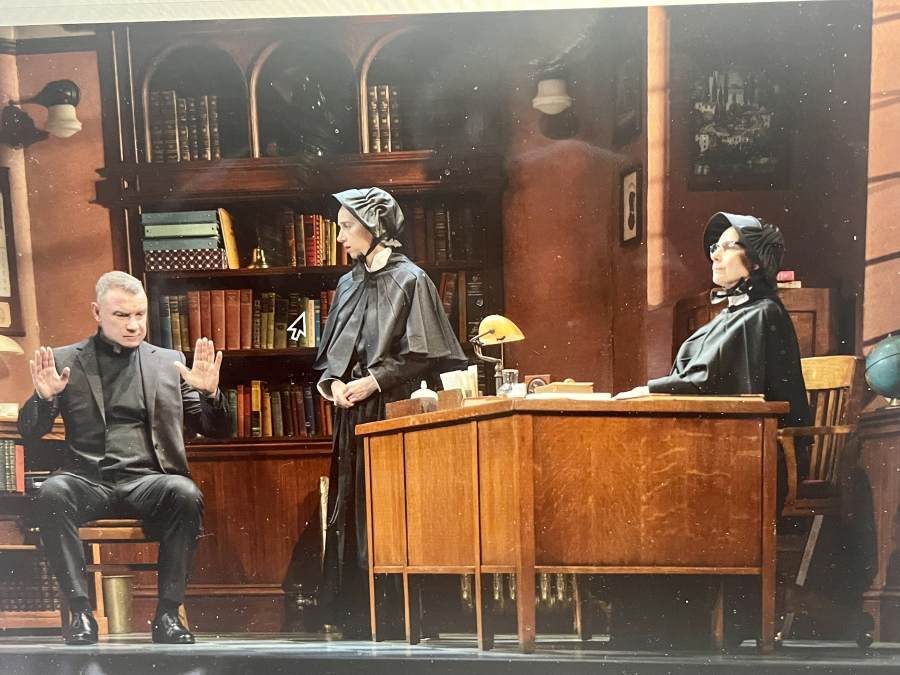

If you ever watched “The Office” (and is there anyone who hasn’t?) you know Holly Flax, the HR person who becomes Michael’s girlfriend. Played by Amy Ryan, she is always smiling, optimistic and a bit goofy. It was hard to envision the same actress as Sister Aloysius Beauvier, the stern director of St. Nicholas’ church and school. Aloysius is blunt and no nonsense. She tries to train Sister James (Zoe Kazan,) a young teacher in the school, to be less caring and more militant. The students fear Sister Aloysius and it’s easy to see why.
Sister Aloysius is intractable. She hates ball point pens, “Frosty the Snowman, long fingernails and attempts to be familiar and modern. Father Flynn (Liev Schreiber) is the living epitome of much of what she dislikes. When she gets an inkling of his possible wrongdoing, she latches onto it. Her only clue was when she thought she saw him touch the wrist of a boy who recoiled from him. Although it seems like hardly enough evidence, Aloysius is certain and relentless.
Ryan is a marvel and we also slightly fear her! She is guarded and tightly wound. As Aloysius, she instructs James to watch Father Brendan Flynn for clues. One skill of playwright John Patrick Shanley’s writing is that for the bulk of the play, nothing is explicitly said or named. Yet we all know it. As does Sister James who begins to doubt him. “Doubt” is set in 1964 and the audience is well aware of all the abuses that were revealed in the church over the years and how the church protected priests rather than admit what they had done. Yet, although we prefer affable Flynn to mirthless Aloysius, we begin to believe her and doubt him.
The boy in question is the only black child in the school and when his mother comes to see Aloysius, we learn that the boy’s father beats him for being ‘the way he is.’ Once again-nothing is spelled out explicitly, but we get it. Confronted with the possibility of wrongdoing by Flynn, the boy’s mother (well-played by Quincy Tyler Bernstine) doesn’t protest or complain. In fact, she’s grateful someone has shown her son some attention and just wants him to make it unscathed to June.
As Aloysius, Ryan is strong and intractable, giving an impressive performance. You can feel her gritting her teeth as she is unswerving in her beliefs. She is determined, like a bulldog with a bone. We sense her frustrations at the restraints of the church. A nun can't be alone with a priest, and she must go up the chain of command. There is no higher-up to whom she can report her suspicions, so she is determined to handle it herself. She feels the Monsignore is ineffectual and will merely ask Flynn who will naturally deny it. Schrieber, who towers over the women, is a actor with a strong stage presence and he endeavors to make Flynn likable. When he delivers his first sermons, he is smiling slightly like he wants to be everyone’s friend. Under Scott Ellis' direction, he is warm and wants everyone to like him. His performance is overpowered by Ryan in her intensity. Despite not liking Aloysius, it was hard not to side with her in her passion. This is a softer, warmer Schrieber than I am used to seeing. As James, Kazan is gentle and anxious to please. Despite her love of teaching, she is ready to change to please Aloysius. She seems wishy-washy, naive, and easily swayed.
The play opens with doubt and ends with doubt. Flynn’s first sermon notes that “doubt can be a bond and when you are lost you are not alone.” Directed by Scott Ellis, the play which premiered in 2005, begins with a sermon on doubt given by Flynn.
By the end, Alysious has somewhat achieved her goal. (spoiler alert) Aloysius gets emotional and feels full of doubt. Flynn isn’t there anymore but he is now in charge of a school so what has she accomplished? The ending feels a bit abrupt and out of place. Is she upset that she might have been wrong or that he has been merely moved and promoted and now he’s in a position to abuse other children? Why does he leave? Is he guilty or does he not want to fight and tarnish his reputation?
The show is powerful and the performances excellent. It also gives an audience something to discuss afterwards. It’s hard to remove the play from history and what we now know about church abuses. The play is still relevant today with abuses still coming to light. Do we think Flynn is guilty because we know some priests abused children? Why does he move from parish to parish? Can we watch the show without beginning to have our own ‘doubts’? I doubt it- we couldn’t.
Roundabout Theatre Company
Todd Haimes Theatre
227 W. 42nd St,
New York, NY